May 20, 2025 | 05:49 GMT +7
May 20, 2025 | 05:49 GMT +7
Hotline: 0913.378.918
May 20, 2025 | 05:49 GMT +7
Hotline: 0913.378.918
Editor's note:
In the era of seas and oceans, Vietnam aspires to emerge as a maritime powerhouse, leveraging the wealth of its expansive aquatic resources. To materialize this ambition, central strategies and projects have underscored mariculture as a pivotal strategy, solution, and inevitable trend to harness the national advantage of golden forests and silver seas.
Nonetheless, the practicality of marine farming in localities today confronts myriad legal barriers, overlapping planning, and policy mechanisms, hindering the realization of maritime endeavors.
This series of articles from the Vietnam Agriculture Newspaper presents genuine records and reflections from Quang Ninh, Binh Thuan, Ninh Thuan, Phu Yen, Khanh Hoa, Kien Giang, and other coastal provinces—the nation's marine farming hubs—with the aim of alleviating bottlenecks and elevating Vietnam's marine farming into a high-value economic industry.
Seven years ago, Ms. Nguyen Thi Hai Binh, General Director of STP Group (Super Truong Phat Plastic Group Joint Stock Company), reminisced about the time spent on a motorboat navigating the marine farming area around Phat Island, Ha Long commune, Van Don district, Quang Ninh province.
Despite her petite stature, Hai Binh's resolute voice resonated amidst the vast ocean waves, leaving few to ponder her determination amidst the sea's expanse.
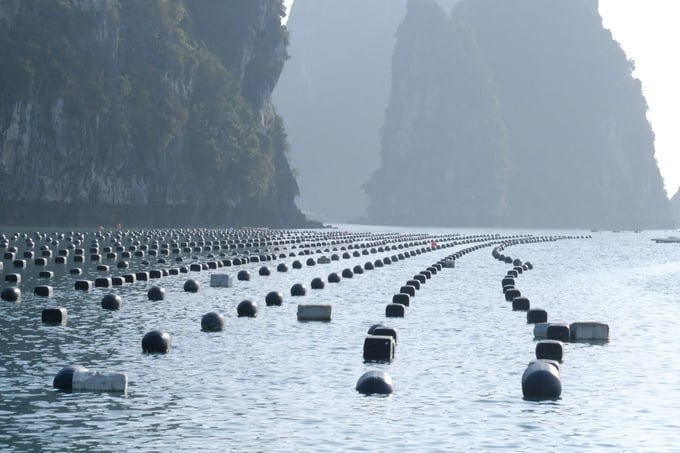
Marine farming in Van Don district, Quang Ninh province. Photo: Kien Trung.
Furthermore, Phat Co Island in the heart of Bai Tu Long Bay, lies a fishing area that has served generations. However, as fish and shrimp stocks dwindled in the sea, with escalating costs of marine expeditions, local inhabitants gradually transitioned towards sea farming. In vast aquaculture areas, residents phased out the cultivation of geoducks and snails in favor of groupers and clams.
As if it had become a norm: when prices surged, individuals rushed to rear their stock, leveraging their homes and securing bank loans for their ventures. Plummeting prices, insurmountable debts, lost homes, and at times, abandoned boats followed initial successes. In recent years, however, oyster farming has witnessed significant growth.
While production processes, linkages, and market structures have become more organized compared to the past, they remain susceptible to fluctuations. In the heart of Bai Tu Long Bay, hundreds of oyster farms dot the water, resembling thousands of warships often depicted in historical films.
Quang Ninh province has designated numerous sea areas in Ban Sen, Ha Long, Thang Loi, Minh Chau, and other locales in Van Don district as pivotal marine farming zones. The district has over 23.8 thousand hectares of water surface area earmarked for marine farming potential, with over 11 thousand hectares within 3 nautical miles and more than 3 thousand hectares beyond 6 nautical miles. The marine farming strategy prioritizes two primary species: mollusks and marine fish. Despite positioning marine farming as a key economic sector, particularly in advantageous locales like Van Don, Quang Ninh province, legal quandaries, and barriers persist, hindering the realization of the sea-farming dream.
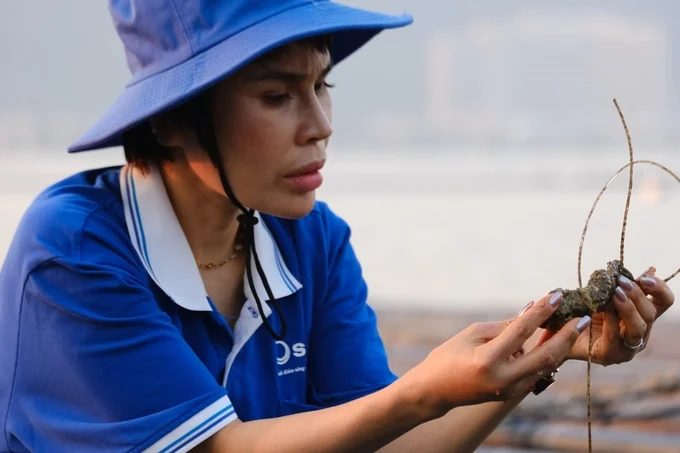
Ms. Nguyen Thi Hai Binh, General Director of STP Group. Photo: Kien Trung.
Responding to the clarion call from various levels and branches of Quang Ninh province, Nguyen Thi Hai Binh and STP Group ventured into the waters of Van Don in 2017. Concurrently, the Phat Co Aquaculture Cooperative was established that same year. United by shared aspirations and objectives, they have collaborated to implement a sustainable marine farming model.
Thanks to the support of technology, capital, and technical processes from STP, Phat Co Cooperative emerged as the first unit in Quang Ninh to transition from traditional aquaculture platforms, rafts, and floats made of bamboo and foam to eco-friendly HDPE material. Furthermore, it pioneered the establishment of an expansive floating farm spanning 8 hectares, featuring operational facilities, visitor-serving cages, and spaces for intercropping and multi-cropping aquaculture.
Transitioning from precarious sea farming conditions, perpetually fraught with legal, disease, environmental, and market risks, the members of Phat Co Cooperative, in collaboration with STP, successfully constructed a thriving model of seaweed cultivation intercropped with Pacific oysters.
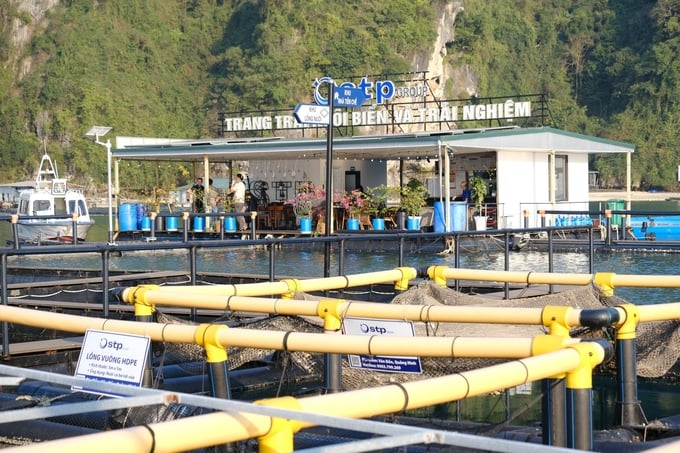
Marine farm that offer tourists real-life experiences. Photo: Kien Trung.
Director Nguyen Sy Binh and Phat Co Cooperative members revealed they cultivate three seaweed crops annually, yielding 70-100 tons per hectare. STP provides farmers with material, substrate, and seed support, along with post-harvest product consumption incentives. Additionally, should market prices exceed commitments by 10%, members have the liberty to engage in free trade. Consequently, each cooperative member accrues over 1 billion VND annually, offsetting interest costs exceeding 300 million VND.
Phat Co pioneered a model integrating aquaculture with community tourism, swiftly garnering recognition as a model cooperative in Quang Ninh province. Since 2020, it has successfully established a closed chain of operations encompassing farming, processing, and market sales of milk oysters. In 2022, a venture into intercropping milk oysters with seaweed further solidified its economic prowess.
Despite the promising outlook, Nguyen Thi Hai Binh cautions against Phat Co becoming a "flagship" due to the litany of challenges and obstacles it encounters.

Intercropping seaweed and Pacific oysters generates high economic value. Photo: Kien Trung.
Implementing marine aquaculture planning and policies to stimulate investment in marine aquaculture within Quang Ninh province, STP Group stands as a pioneering enterprise in crafting project documents for submission to all levels, seeking licenses to utilize marine resources within the designated planning areas of Van Don, Cam Pha, and Ha Long.
Building on the successes achieved with the intercropping model of cartilage seaweed and milk oysters, and the fish farming model in Bai Tu Long Bay, Nguyen Thi Hai Binh harbors ambitions to replicate interconnected chains and upscale marine farming to an industrial level. With proposed expansions across 318 hectares in Cam Pha, 120 hectares in Ha Long, and 96 hectares in Van Don, this determined entrepreneur believes firmly in the potential, advantages, resources, and technological capabilities of STP. However, despite seven years of persistent efforts, the elusive license remains out of reach due to many persistent obstacles.
"Quang Ninh province's zoning plan delineates each sea farming area and allocates sea usage authority from districts and provinces to ministries and branches. We have diligently compiled documents and solicited feedback from every relevant agency in accordance with regulations, yet regrettably, we remain ensnared in bureaucratic limbo," lamented the General Director of STP.
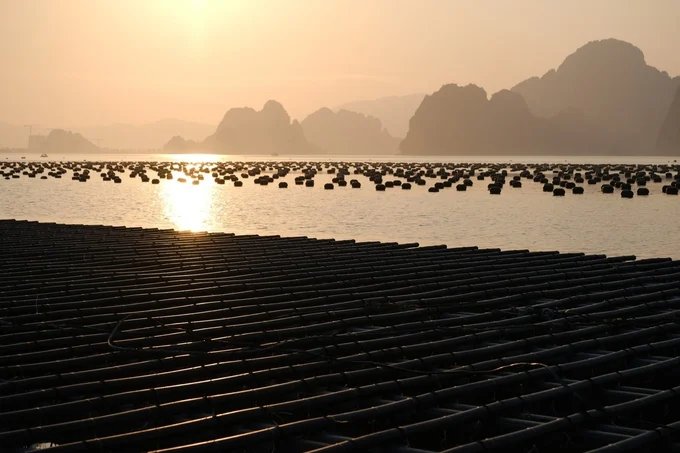
After 7 years of staying at Van Don beach, they still need a marine farming license. Photo: Kien Trung.
It's worth noting that Quang Ninh has implemented Decree 11/2021/ND-CP, which governs the allocation of specific sea areas to organizations and individuals for the exploitation and utilization of marine resources. Complementing this initiative is a series of policies designed to attract investment, along with establishing steering committees and dedicated working groups to bolster support for the business community, cooperatives, and individuals, thereby unlocking the vast potential of marine farming. However, issuing marine farming licenses remains excessively challenging, particularly in designated farming areas, underscoring the persistence of bureaucratic hurdles.
In our ongoing STP projects, even though the authority to grant licenses lies with the Provincial People's Committee, it necessitates soliciting opinions from multiple ministries and branches, including the Ministry of Natural Resources and Environment, Ministry of Agriculture and Rural Development, Ministry of Transport, Ministry of Foreign Affairs, Ministry of National Defense, and Ministry of Public Security.
"The most arduous aspect is that obtaining approval from the Ministry of Agriculture and Rural Development requires endorsement from the Ministry of Natural Resources and Environment. Conversely, gaining approval from the Ministry of Natural Resources and Environment necessitates permits and endorsements from other ministries and branches. Furthermore, in certain areas designated for project implementation lying beyond 6 nautical miles, within the buffer zone of the World Natural Heritage, authority must be sought from the Prime Minister. Consequently, investors face formidable challenges," lamented the General Director of STP, expressing deep frustration.
In tandem with implementing marine farming projects in Quang Ninh, STP Group concurrently prepares documentation to apply for marine farming projects in Khanh Hoa and Ninh Thuan provinces. General Director Nguyen Thi Hai Binh remarked, "Marine aquaculture is a distinctive domain. While we perceive significant opportunities and potential, they are accompanied by many challenges, including substantial investment, adherence to environmental standards and regulations, considerations of density and productivity, and structural aspects of cages. These challenges, compounded by the complexity and overlap of regulations, deter investors from realizing their aspirations of venturing into marine farming.
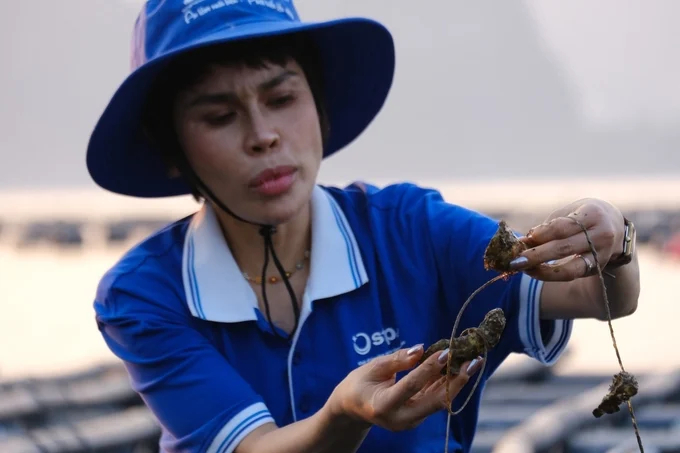
Without a marine farming license, businesses, cooperatives, and people will have no legal investment basis. Photo: Kien Trung.
"Without a marine farming license, both businesses, cooperatives, and individuals lack a legal foundation for investment," emphasized Ms. Binh. "Investments in marine farming entail substantial financial support aimed at facilitating the transition of marine farming materials, breeds, and technological advancements, alongside environmental enhancements, to ensure successful implementation."
Chains of intercropping of seaweed and oysters have reached tens of billions of dong. Not to mention infrastructure investments, cages to combine with tourism, and risks due to epidemics and market investors must bear all of them.
The most worrying thing is that the chain of connections built for many years is at risk of breaking at any time. The reason is that without a marine farming license, both businesses and cooperatives and people will have no legal basis to invest. In addition, processing enterprises and consumption enterprises do not dare to place orders even though the market has many advantages.
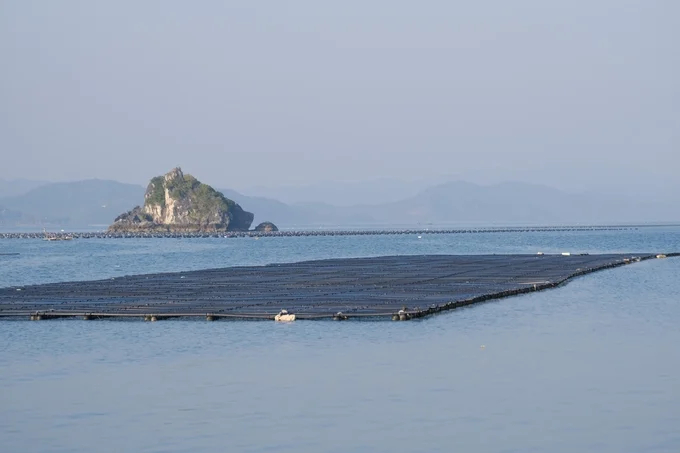
Planning for marine farming in Quang Ninh province. Photo: Kien Trung.
The entire Van Don district now has more than 65 seafood cooperatives, many of which are affiliated with businesses to produce according to orders from the export market jointly. Size, type, output, season, farming area code... all have significant advantages. However, the legal basis is still precarious, the need for a marine farming license is like a tight grip on the marine farming community in Van Don.
For the whole Quang Ninh province, with a 250 km long coastline running from Mong Cai to Quang Yen, the area of marine farming is more than 45,000 hectares, and the mining land identifies marine farming as a key economic sector. The project to develop marine aquaculture until 2030, with a vision to 2045, approved by the Prime Minister, also identifies Quang Ninh as the national marine aquaculture center. The Department of Agriculture and Rural Development of Quang Ninh province has also published documents to attract investment in marine farming. Mong Cai, Hai Ha, Dam Ha to Van Don, Co To, Quang Yen... The total area of attraction is about 13.4 thousand hectares, but up to now, not a single investor has been granted a license.
Translated by Quynh Chi

(VAN) This was the assessment shared by experts at the workshop titled 'Assessing the Role and Potential of Low-Emission Rice Production Systems in Vietnam,' held on the morning of May 19.

(VAN) Cai Rong Port is the fisheries control center of Quang Ninh, helping to monitor fishing vessels, combat IUU fishing, and remove the EC's 'yellow card'.

(VAN) The German Agricultural Society (DLG) explores the possibility of establishing a mechanization service center in Vietnam’s Mekong Delta to support farmers in accessing and utilizing advanced machinery.

(VAN) On May 16, the Department of Water Resources Management, in collaboration with the Food and Agriculture Organization of the United Nations (FAO), held a signing ceremony for the GEF-8 project document.

(VAN) Food safety, mechanization, vocational training, and market opening are key areas of cooperation expected between the Vietnamese Government and the Federal Republic of Germany.

(VAN) Deputy Minister Nguyen Quoc Tri also expressed his hope that Cuba will soon overcome its current challenges, attain food security, and further expand cooperation with Vietnam.

(VAN) The project contributes to enhancing the resilience of communities vulnerable to the impacts of climate change, with a primary focus on local women.